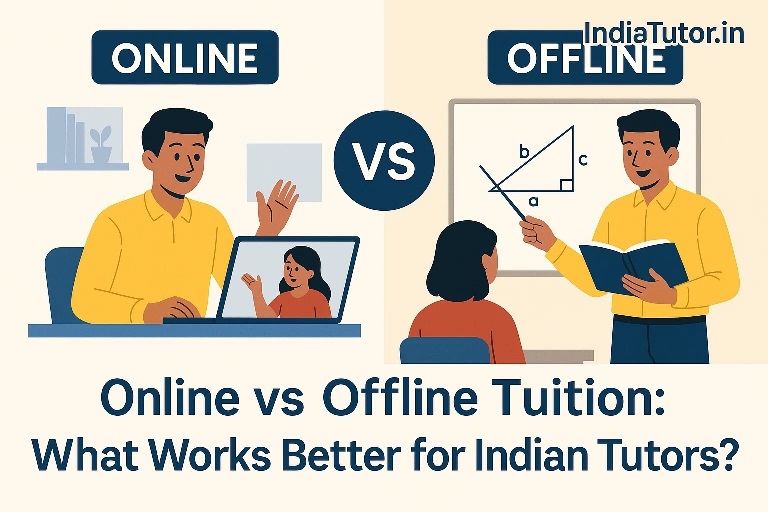Online tutoring in India has seen a massive rise over the past few years, especially since the pandemic made remote learning the norm. Today, thousands of teachers across India are successfully running online classes from their homes, connecting with students not just locally but globally.
According to a report by RedSeer, India’s ed-tech market is expected to reach $10 billion by 2025, with a significant share coming from online tutoring. At IndiaTutor.in, we see hundreds of tutors getting discovered every month by students and parents looking for quality education online.
But while teaching online brings flexibility and opportunity, it also comes with its own set of challenges. Based on our experience with thousands of tutors, here are some important do’s and don’ts every Indian tutor should follow to succeed in online tutoring.
Do’s of Online Tutoring
1. Do set up a professional teaching space
Your teaching environment matters. Choose a quiet, well-lit corner of your home. Make sure your background is tidy and non-distracting. Invest in a good-quality webcam, microphone, and stable internet connection. A ring light or desk lamp can also help you look more professional on screen.
2. Do plan your lessons in advance
Online students expect clarity and structure. Prepare your lessons, slides, and notes ahead of time. Use tools like Google Slides, PDFs, or virtual whiteboards to make your sessions interactive. Platforms like Canva and Jamboard are free and easy to use.
3. Do keep sessions interactive
In online classes, it’s easy for students to lose focus. Ask questions, use polls or quizzes, and encourage discussions. Simple things like calling the student by name or giving them short tasks during class help improve engagement.
4. Do take feedback seriously
At the end of the week or month, ask your students or their parents for feedback. What do they like? What could be better? Constructive feedback helps you improve and shows that you care about their learning.
5. Do use simple and clear language
Remember, many students may not be fluent in English. Use simple explanations, avoid complex jargon, and encourage students to ask questions when in doubt. Regional language support can be an added advantage.
6. Do respect student time and learning pace
Start and end your sessions on time. Give students time to ask questions and revise. Be patient with slow learners. Each student is unique, and online learning needs a personal touch.
7. Do update yourself regularly
Stay updated with new teaching tools, syllabus changes, and exam formats. Platforms like NCERT, Diksha app, or CBSE’s official site provide useful updates. You can also join tutor forums or take short online teaching courses.
Don’ts of Online Tutoring
1. Don’t rely only on lectures
One-way speaking doesn’t work well online. Avoid talking non-stop for 45 minutes. Break up your lecture with examples, questions, and visual aids. Use screen sharing to show diagrams, charts, or even YouTube videos where appropriate.
2. Don’t ignore technical quality
Poor audio, blurry video, or frequent internet issues can lead to frustration and dropouts. Always test your setup before class. Have a backup internet plan, such as a mobile hotspot, in case of power failure.
3. Don’t cancel or reschedule too often
Consistency builds trust. Frequent cancellations affect your credibility. Plan your day in advance and inform students early if there’s an emergency.
4. Don’t use unverified or incorrect content
Many tutors simply pick content from the internet without checking accuracy. Always refer to verified curriculum sources like NCERT, ICSE, or Cambridge resources. Wrong content can lead to confusion and mistrust.
5. Don’t multitask during sessions
Avoid checking your phone, replying to messages, or doing household work during classes. Students can sense a lack of attention, which affects their learning and motivation.
6. Don’t forget to maintain records
Keep a log of student attendance, topics covered, and homework assigned. Share progress reports monthly. Parents appreciate transparency and regular updates.
7. Don’t neglect your own wellbeing
Online tutoring can be tiring, especially with back-to-back classes. Take regular breaks, stretch, and rest your eyes. A tired teacher can’t give their best.
My Thoughts
Online tutoring is one of the most rewarding and flexible professions today, especially for women, retired teachers, and students looking for side income. But to succeed, it’s not enough to just know your subject — you must also master the art of engaging students virtually.
At IndiaTutor.in, we help you connect with students and build your teaching brand. Follow these do’s and don’ts, and you’ll not only retain your students but also grow your reputation as a reliable and professional tutor.
If you’re new to online tutoring and want to get started, create your free tutor profile today on IndiaTutor.in. Your journey as an impactful educator begins here.
By Nidhi Mehta, Founder, IndiaTutor.in


